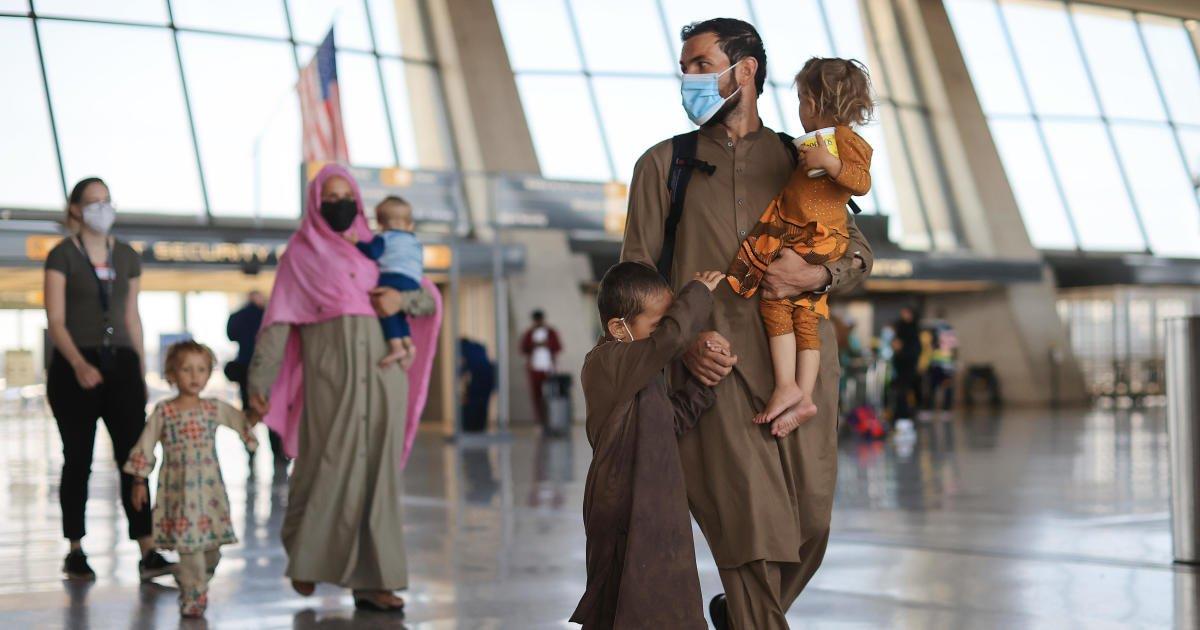(MENAFN- Khaama Press)
DULLES, VIRGINIA – AUGUST 27: Refugees arrive at Dulles International Airport after being evacuated from Kabul following the Taliban takeover of Afghanistan on August 27, 2021, in Dulles, Virginia. Refugees continued to arrive in the United States one day after twin suicide bombings at the airport gates in Kabul killed 13 U.S. military service members and nearly 100 Afghans.“We will not forgive,” President Joe Biden warned ISIS, who claimed responsibility for the attacks.“We will not forget. We will hunt you down and make you pay.” (Photo by Chip Somodevilla/Getty Images) A bipartisan coalition of U.S. Senators and Representatives has re-introduced the Afghan Adjustment Act.
If the bill passed, tens of thousands of Afghans who worked with the American forces and were evacuated from the country in the fall of 2021 would have a path to citizenship.
Most refugees were granted humanitarian parole and sent to the U.S., which is a temporary immigration status which is to expire in a few months.
The Biden administration has already begun a second batch of two-year“humanitarian parole” grants for Afghan evacuees. Humanitarian parole, however, does not permit someone to apply for a green card or any other permanent status; it just permits them to reside and work legally in the United States temporarily.
Additionally, parole is subject to ongoing executive approval and is open to elimination by a succeeding president or legal challenge, just like any other discretionary immigration programme.
Afghans who helped the American military are eligible for Special Immigrant Visas (SIVs), which do allow the holder to apply for a green card, but the SIV procedure has been slow.
However, thousands of Afghan evacuees had already submitted SIV applications and were awaiting a decision when they were evacuated.
According to DHS, more than 33,000 Afghan evacuees were SIV applicants as of early 2022, Immigration Impact reported.
The Afghan Adjustment Act of 2023 would work as follows:
Afghans who are in the U.S. as of the date the bill is enacted – both those who had entered on visas and those who were paroled into the U.S. during and after the withdrawal – and their spouses and kids would be eligible to apply for green cards, once the Department of Homeland Security issues guidance about how exactly they should do so. (The bill requires DHS to issue interim guidance within 90 days of the bill's passage and final guidance within the first year.) Afghans who enter the U.S. after the bill is enacted would also be eligible for green cards if the Department of Homeland Security certifies that they“directly and personally supported” the U.S. mission in Afghanistan. (This provision could help Afghans who applied for humanitarian parole but were stymied by the Slow and Inconsistent way DHS adjudicated those applications.) The applicants will be subjected to the same criminal and security bars as anyone else applying for admission to the United States. The federal government will be allowed to waive some criminal bars. However, it cannot waive any bar related to drug trafficking or terrorism or ignore any crime committed after July 2021 in the U.S. Applicants for green cards will be subject to a similar level of vetting as they would be if they were applying to come to the U.S. as part of the United States Refugee Admission Program (USRAP) – an intense review process involving several levels of background checks – before being approved. Suppose an applicant submits an endorsement from the State Department (via a“Chief of Mission”) as part of their successful application. In that case, their green card will be backdated to the day they were initially admitted or paroled into the U.S. – shortening the wait before they can apply for U.S. citizenship. Afghans who receive green cards under this bill will not be subjected to the typical five-year waiting period before receiving certain public benefits. The bill also expands eligibility for Special Immigrant Visas to Afghans who helped the U.S. in Afghanistan but had been ineligible for SIV status, such as female members of Afghanistan's former military units.
Sharefacebook twitter whatsapp linkedin email print tumblr telegram




















Comments
No comment